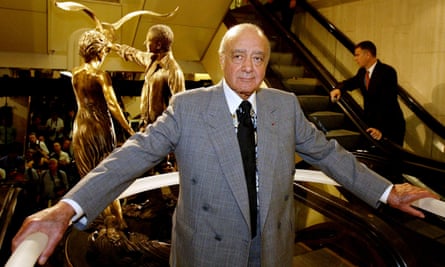It was one of the abiding mysteries of public life. How did Piers Morgan rise so far? I see him as a buffoon, a bully, a windbag. Yet, despite scandals that would have killed most people’s careers, he rose like a methane bubble in a slurry lagoon, occupying some of the most prestigious and lucrative positions in the media. This week, reflecting on the life and abuses of the plutocrat Mohamed Al Fayed, Private Eye magazine produced an explanation. It came from Morgan himself, writing about Fayed in 1999. “I’ve always made it a strict rule in life to ingratiate myself with three categories of people: newspaper owners, potential newspaper owners and billionaires. And since Mohamed Al Fayed is a billionaire and would love to own a newspaper, sucking up to him seems an extremely sensible move.”
The strategy is not unusual. But voicing it is. Morgan expressed the unspoken rule of public life out loud. If you want to get ahead, grovel to billionaires, especially those who own the media. The obvious coda to the rule is: “because they are the people with real power”.
Plenty of rules are broken without consequence. You can appear on the BBC while hiding your financial interests, breaking its editorial guidelines, as long as you are channelling the demands of the very rich. You can breach parliamentary rules without punishment – by lying, or by failing to update your register of interests, or by taking a second job without clearance when your ministerial career ends – as long as you remain a loyal servant of big money. But Morgan’s Rule is the one that must not be broken. If you are a political party and you want a sniff at power, if you are a commentator who wants to appear on the BBC, you must observe it. Otherwise you will be vilified or excluded.

‘Since Mohamed Al Fayed is a billionaire and would love to own a newspaper, sucking up to him seems an extremely sensible move,’ wrote Piers Morgan in 1999. Photograph: Reuters
Morgan and journalists like him are members of the concierge class, which provides a wide range of services to economic power. Some of them, such as editors of the billionaire media and the junktanks of Tufton Street, specialise in translating the outrageous demands of oligarchs and corporations into what looks like political common sense, or in attacking plutocrats’ critics or transferring blame for their impacts on to immigrants, the Labour party and other customary scapegoats.
Some of them, such as lobbyists, specialise in reputation-laundering: brokering deals between grim plutocrats and cultural institutions – universities, museums, opera houses, charities – which, in return for lavish donations, will name faculties, professorships, galleries, funds and prizes after their sponsors, transforming violent kleptocrats into pillars of society.
Others, including lawyers, accountants, bankers and wealth managers, specialise in hiding and washing their money, buying them special visas, or suing and hounding their critics. This is why organised crime loves London. It takes advantage of both England’s ultra-permissive financial laws and its ultra-repressive libel laws.
The government is always ready to help. In 2021, while Rishi Sunak was chancellor of the exchequer, lawyers acting for Yevgeny Prigozhin, the late brutal chief of Russia’s Wagner mercenary group, applied to the Treasury for permission to override the sanctions against him, so that he could sue the investigative journalist Eliot Higgins. Sunak’s Treasury granted the special licences they requested and even approved sanctions-busting flights to St Petersburg so they could plan their legal attack.
In this way a few dozen people, assisted by thousands of concierges, can dominate our lives. The system we call democracy is a mere patina, sticky and dimpled, on the surface of oligarchic power.
There are many ways in which economic power translates into political power, and none of them are good for us. The most obvious is campaign finance: the sponsorship not only of political parties but of entire systems of political thought and action. These transactions muscle the interests of society out of politicians’ minds. Some of them are enormous. Last year, the US website the Lever exposed a $1.3bn (£1bn) transfer of money from a little-known billionaire, Barre Seid, to a new political advocacy group run by an ultraconservative. How can mere citizens compete?
Morgan and journalists like him are members of the concierge class, which provides a wide range of services to economic power. Some of them, such as editors of the billionaire media and the junktanks of Tufton Street, specialise in translating the outrageous demands of oligarchs and corporations into what looks like political common sense, or in attacking plutocrats’ critics or transferring blame for their impacts on to immigrants, the Labour party and other customary scapegoats.
Some of them, such as lobbyists, specialise in reputation-laundering: brokering deals between grim plutocrats and cultural institutions – universities, museums, opera houses, charities – which, in return for lavish donations, will name faculties, professorships, galleries, funds and prizes after their sponsors, transforming violent kleptocrats into pillars of society.
Others, including lawyers, accountants, bankers and wealth managers, specialise in hiding and washing their money, buying them special visas, or suing and hounding their critics. This is why organised crime loves London. It takes advantage of both England’s ultra-permissive financial laws and its ultra-repressive libel laws.
The government is always ready to help. In 2021, while Rishi Sunak was chancellor of the exchequer, lawyers acting for Yevgeny Prigozhin, the late brutal chief of Russia’s Wagner mercenary group, applied to the Treasury for permission to override the sanctions against him, so that he could sue the investigative journalist Eliot Higgins. Sunak’s Treasury granted the special licences they requested and even approved sanctions-busting flights to St Petersburg so they could plan their legal attack.
In this way a few dozen people, assisted by thousands of concierges, can dominate our lives. The system we call democracy is a mere patina, sticky and dimpled, on the surface of oligarchic power.
There are many ways in which economic power translates into political power, and none of them are good for us. The most obvious is campaign finance: the sponsorship not only of political parties but of entire systems of political thought and action. These transactions muscle the interests of society out of politicians’ minds. Some of them are enormous. Last year, the US website the Lever exposed a $1.3bn (£1bn) transfer of money from a little-known billionaire, Barre Seid, to a new political advocacy group run by an ultraconservative. How can mere citizens compete?

‘Rishi Sunak’s administration, run by an oligarch for oligarchs, produces assurances that it will close economic crime loopholes, then subtly tweaks the legislation to keep them open.’ Photograph: Dan Kitwood/PA
Financial power also ensures that the rules supposed to stop economic crime and the laundering of its proceeds contain loopholes wide enough for a superyacht to sail through. For the past few months, members of the House of Lords have been battling to remove the obvious get-out clauses from the economic crime bill passing through parliament. The government has thwarted it at every turn. In the debate on Monday, the Conservative peer Lord Agnew – the very opposite of a radical firebrand – complained that “the government continue to say one thing and then do something different”. Sunak’s administration, run by an oligarch for oligarchs, produces heart-thumping assurances that it will close the loopholes, then subtly tweaks the legislation to keep them open.
Money’s might ensures that its environmental impacts are unrestrained. Recently, I was told about a multimillionaire who had intended to fly in his private jet to a luxury resort, only to change his mind at the last minute and decide to go to a different place, with a shorter landing strip. The plane was too heavy to land there, so it sat on the tarmac and burnt off $15,000 of fuel before setting out. Sunak treats the UK as a flyover state, travelling by helicopter and private jet to places he could easily reach by train. Kylie Jenner and Floyd Mayweather zip about on private flights of less than 20 minutes. Each of them negates the efforts of thousands of ordinary mortals to live within the limits of a habitable planet.
But these specific impacts fail to capture the aggregate effect: the remarkable way in which society comes to reflect the demands of the ultra-rich. Almost everyone in public life accepts the same set of preposterous beliefs. That economic growth can continue indefinitely on a finite planet; that the unhindered acquisition of enormous fortunes by a few is acceptable, even commendable; that they should be allowed to own as much natural wealth as their money permits; that there’s nothing objectionable about a few offshore billionaires owning the media and setting the political agenda; that anyone who disputes such notions has no place in civil society. We are free to speak, up to but not beyond this point: the point on which everything hangs.
Morgan’s maxim is not just the unspoken rule. It is also the unspeakable truth. Everyone knows it, hardly any will mention it. It underpins our august institutions, our legal codes, our manners and mores. It is the great silence we need to break.
Financial power also ensures that the rules supposed to stop economic crime and the laundering of its proceeds contain loopholes wide enough for a superyacht to sail through. For the past few months, members of the House of Lords have been battling to remove the obvious get-out clauses from the economic crime bill passing through parliament. The government has thwarted it at every turn. In the debate on Monday, the Conservative peer Lord Agnew – the very opposite of a radical firebrand – complained that “the government continue to say one thing and then do something different”. Sunak’s administration, run by an oligarch for oligarchs, produces heart-thumping assurances that it will close the loopholes, then subtly tweaks the legislation to keep them open.
Money’s might ensures that its environmental impacts are unrestrained. Recently, I was told about a multimillionaire who had intended to fly in his private jet to a luxury resort, only to change his mind at the last minute and decide to go to a different place, with a shorter landing strip. The plane was too heavy to land there, so it sat on the tarmac and burnt off $15,000 of fuel before setting out. Sunak treats the UK as a flyover state, travelling by helicopter and private jet to places he could easily reach by train. Kylie Jenner and Floyd Mayweather zip about on private flights of less than 20 minutes. Each of them negates the efforts of thousands of ordinary mortals to live within the limits of a habitable planet.
But these specific impacts fail to capture the aggregate effect: the remarkable way in which society comes to reflect the demands of the ultra-rich. Almost everyone in public life accepts the same set of preposterous beliefs. That economic growth can continue indefinitely on a finite planet; that the unhindered acquisition of enormous fortunes by a few is acceptable, even commendable; that they should be allowed to own as much natural wealth as their money permits; that there’s nothing objectionable about a few offshore billionaires owning the media and setting the political agenda; that anyone who disputes such notions has no place in civil society. We are free to speak, up to but not beyond this point: the point on which everything hangs.
Morgan’s maxim is not just the unspoken rule. It is also the unspeakable truth. Everyone knows it, hardly any will mention it. It underpins our august institutions, our legal codes, our manners and mores. It is the great silence we need to break.







